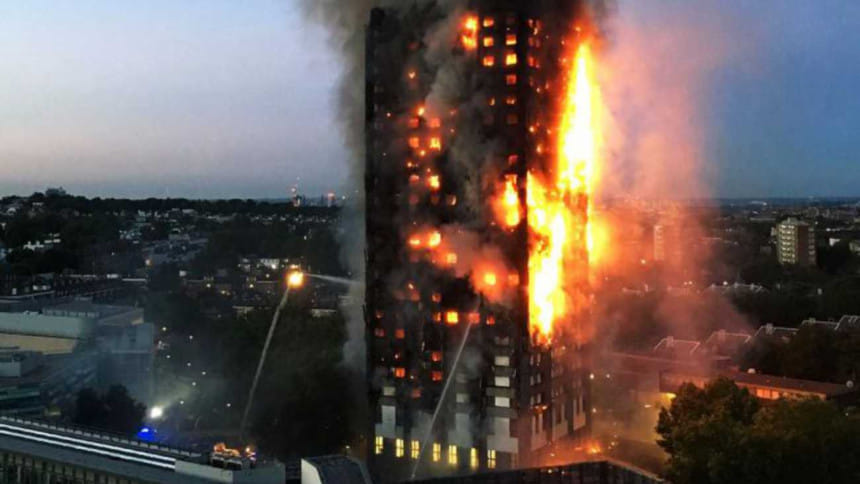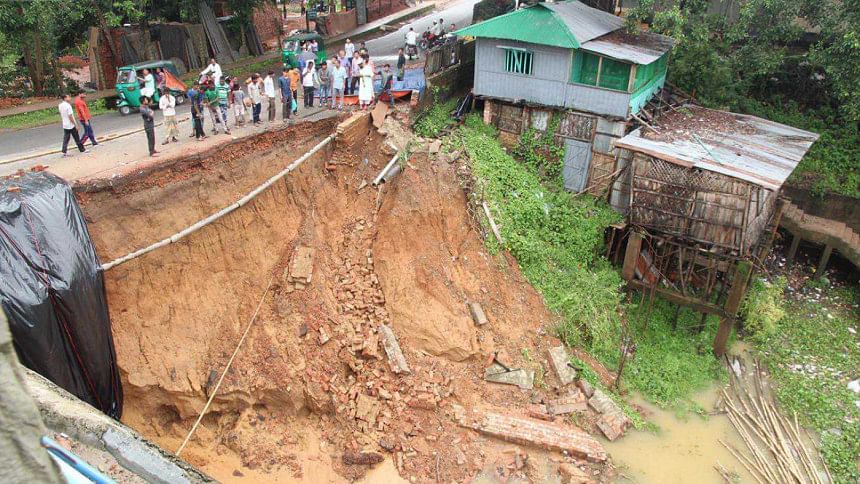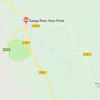Two disasters, two countries, two peoples

Consecutively on June 13 and 14, major disasters hit Bangladesh and the United Kingdom. On the morning of the 13th, landslides killed more than 150 people, and four army personnel, in Chittagong and Chittagong Hill Tracts districts of Bangladesh. And in the early hours of the 14th, a fire in a 24-storied apartment complex, the Grenfell Tower, killed around 80 people in London. Both the disasters killed poor and marginalised people. In Bangladesh, the victims were "nameless" as well.
While a faulty fire alarm system and inflammable building materials may be attributed to the London fire, massive illegal deforestation and hill-cutting led to the landslides in Bangladesh. Sadly, most Bangladeshis had other "more important" problems to address than doing anything for the landslide victims. However, there's more to the story. While the poor are inert and indifferent to disasters (beyond the immediate vicinity), the rich aren't forthcoming with financial support and empathy with the victims.
As it appeared on British media reports, including BBC, for the first few days, more than 80 percent of the news coverage was about the Grenfell Tower disaster. Even more than two weeks after the disaster, British media, politicians, members of the civil society, intellectuals, and ordinary people were mourning the "avoidable" deaths, empathising with the victims, helping them generously, and condemning the various government departments for negligence, which led to the disaster. The Queen, Prime Minister Theresa May, national leaders, including local MP Jeremy Corbyn, London Mayor Sadiq Khan, and thousands of people visited the disaster zone. Jeremy Corbyn has gone to the extent of asking the government to requisition homes of the rich for fire survivors—like Churchill did to rehabilitate survivors of German bombings during World War II. Fifteen victims of the fire met the prime minister at her residence. There was also a one-minute silence observed at the Buckingham Palace; and on Monday, June 18, the whole nation observed one-minute silence, to show respects to the victims.

Meanwhile Bangladeshis who understand, and enjoy cricket, were busy watching the live telecast of the ICC cricket competition from Britain; and in the same day of the disaster, the prime minister went to her scheduled overseas trip to Sweden. Within 48 hours, people's attention seemed to have shifted from the disasters that befell the poor. However, had the victims been members of the urban rich, Bangladesh would have mourned their deaths longer. Poor villagers, urban squatters, and slum dwellers in Bangladesh are much more fragmented, isolated, inert, introvert, and as "sack of potatoes"—to paraphrase Marx—don't take "political" decisions (in the broad sense of the term) on their own, and need outsiders, often their own class enemies, to lead them or take decisions on their behalf. Hence this collective neglect of the poor by people who "matter", and those who don't, across Bangladesh!
The bulk of the poor urban and rural squatters in Bangladesh—many totally landless—come from the typical fragmented and faction-ridden peasant communities, having strong patron-client relationship, where the powerless clients having very low self-esteem, work only for their patrons, not for society or the nation at large. To the bulk of these poor, society is made of immediate clan members or uprooted fellow proletarians; the state and nation seem to be too remote and abstract to understand, let alone integrate into. They only know their local patrons, the village elders or matbars, "tribal chiefs", and "mafia bosses" who are well-connected to local MPs, powerbrokers, and ministers, who could be ruthless and benign at the same time.
"The ubiquitous matbar-MP-minister nexus, not nationalism, determines the politics of Bangladesh. Thus, the environment-unfriendly Rampal power plant, rapes and abductions of poor women, and all disasters beyond their immediate neighbourhood are too distant and irrelevant to the bulk of the population. Why so?
The ubiquitous matbar-MP-minister nexus, not nationalism, determines the politics of Bangladesh. Thus, the environment-unfriendly Rampal power plant, rapes and abductions of poor women, and all disasters beyond their immediate neighbourhood are too distant and irrelevant to the bulk of the population. Why so?
We know, the East India Company added certain new elements to Bengal's administration, land system, and culture. It was the new land system called the Permanent Settlement aka the Zamindari system of 1793, which radically moulded the administrative machinery, and the popular and political culture of what is now Bangladesh. The Zamindari system fragmented the rural community and the budding urban society by establishing neo-feudal relationship and patron-client relationship. Surprisingly, Paschim Banga (erstwhile West Bengal) also had a similar land system but elites, middle and working classes there have been very assertive and uncompromising. They empathise with victims of natural and manmade disasters, and don't shy away from questioning and challenging the authorities.
One may impute this to the rise of Western educated upper, and middle classes in and around Kolkata since late 18th century, mainly emerging out of the direct beneficiaries of the Zamindari system. Members of these Hindu Bhadralok classes have been urbane, capitalist, and some even active leaders of trade unions, socialist and communist movements. Again, unlike Bangladesh, less dependency on agriculture—due to the urbanisation and industrialisation process that started in late 18th century in and around Kolkata—has weakened peasant and pre-capitalist production relations, and patron-client relationship in Paschim Banga.
Bangladesh, which was a rural and agrarian hinterland of West Bengal up to 1947, still remained culturally rural and peasant. Hence the collective indifference of the people and their government to the suffering of the common people across Bangladesh. One may attribute this "alienation-indifference syndrome" to "post-colonialism", which renowned British-Pakistani sociologist late Hamza Alavi has used in the pejorative sense of the expression. As Alavi has argued, having an over-developed bureaucracy and military, and an under-developed civil society, ruling classes in post-colonial Pakistan and Bangladesh lack much sense of belonging to the state, or patriotism which may be translated into "colonial hangover", "mass alienation from people", and "absence of empathy/sympathy with the ordinary people". The culture of unaccountability of the ruling/rich classes—never that synonymous till the rise of Ershad autocracy—has also turned the ordinary people apathetic to others' sufferings, as they have their own grievances to redress.
Now, is it necessary or possible to compare the behaviour of the British government and people with their Bangladeshi counterparts vis-à-vis the recent disasters that befell their countries in mid-June? We simply can't compare countries with accountable governance having well-entrenched democratic, urban, and egalitarian values with a "post-colonial", "soft state" like Bangladesh, which lacks these values. The ruling elites and ordinary people are segregated vertically, on political and economic lines, and the ordinary people are separated from each other horizontally, on factional, religious, political, and economic lines in Bangladesh, a fractured post-colonial state—not a well-knit nation state.
Interestingly, many poor countries, including India, manage disasters more efficiently than Bangladesh. It's not lack of resources that impedes disaster management, but it's lack of national solidarity, accountable governance, and mass empathy with people in distress. Surprisingly, "baby boomers" (born between 1946 and 1960)—the generation that took part in the Liberation War—and "millennials" (born between mid-1980s and early 2000s) of Bangladesh (both supposed to be articulated, brave, and liberal), to put it mildly, also seem to be apathetic and opportunistic, even during times of national emergencies.
The writer teaches security studies at Austin Peay State University. He is the author of several books, including his latest, Global Jihad and America: The Hundred-Year War Beyond Iraq and Afghanistan (Sage, 2014).
E-mail: [email protected]










Comments